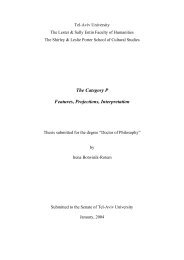Development and Initial Validation of the Hangover Symptoms Scale ...
Development and Initial Validation of the Hangover Symptoms Scale ...
Development and Initial Validation of the Hangover Symptoms Scale ...
You also want an ePaper? Increase the reach of your titles
YUMPU automatically turns print PDFs into web optimized ePapers that Google loves.
DEVELOPMENT OF THE HANGOVER SYMPTOMS SCALE 1445<br />
Variable<br />
Table 2. Characteristics <strong>of</strong> Alcohol Involvement Among College Students<br />
All participants<br />
(n 1211–1225)<br />
(%)<br />
Men<br />
(n 465–470)<br />
(%)<br />
Women<br />
(n 746–755)<br />
(%)<br />
Lifetime drinking occasions<br />
1–10 13 8 16<br />
11–100 36 28 41<br />
101–1000 38 43 36<br />
1000 12 21 7<br />
Age first drank (years)<br />
11 4 5 3<br />
11–14 30 35 27<br />
15–16 45 36 50<br />
17–18 21 21 20<br />
18 2 2 1<br />
Past-year frequency <strong>of</strong> drinking<br />
1 day a month 23 16 28<br />
1–3 days a month 34 30 37<br />
1–2 days a week 31 38 27<br />
3 days a week 11 17 8<br />
Past-year frequency <strong>of</strong> getting drunk<br />
Never 16 12 19<br />
1 day a month 37 32 41<br />
1–3 days a month 30 32 29<br />
1–2 days a week 15 21 11<br />
3 days a week 2 4 1<br />
Past-year typical quantity drank<br />
1 drink 10 7 12<br />
2–3 drinks 24 13 31<br />
4–5 drinks 33 25 39<br />
6–7 drinks 19 26 15<br />
7 drinks 14 30 4<br />
Lifetime alcohol-related problems 32 35 30<br />
Parental alcohol-related problems 23 23 23<br />
RESULTS<br />
For both sets <strong>of</strong> hangover symptoms items – those based<br />
on <strong>the</strong> first few lifetime drinking occasions <strong>and</strong> those based<br />
on <strong>the</strong> past year drinking occasions – we examined <strong>the</strong><br />
prevalence <strong>of</strong> each <strong>of</strong> <strong>the</strong> 13 individual hangover symptoms,<br />
conducted a principal components analysis <strong>of</strong> <strong>the</strong> hangover<br />
symptom items, assessed <strong>the</strong> psychometric characteristics<br />
<strong>of</strong> full <strong>and</strong> short-form versions <strong>of</strong> <strong>the</strong> HSS, <strong>and</strong> evaluated<br />
<strong>the</strong> relations <strong>of</strong> <strong>the</strong> HSS with alcohol use, alcohol-related<br />
problems, parental alcohol-related problems, <strong>and</strong> sex. Both<br />
sets <strong>of</strong> items yielded very similar results. The correlation<br />
between <strong>the</strong> hangover scales indexing <strong>the</strong> two different<br />
drinking epochs was 0.79, indicating a high degree <strong>of</strong> stability<br />
<strong>of</strong> hangover symptoms <strong>and</strong> suggesting that <strong>the</strong>re was<br />
little unique information captured by our assessments <strong>of</strong><br />
hangover at <strong>the</strong> initiation <strong>of</strong> <strong>the</strong> drinking career versus in<br />
<strong>the</strong> past year. Therefore, for all subsequent analyses, we<br />
only present <strong>the</strong> results <strong>of</strong> those based on hangover symptoms<br />
that occurred in <strong>the</strong> past year.<br />
Prevalence <strong>of</strong> <strong>Hangover</strong> <strong>Symptoms</strong> in <strong>the</strong> Past Year<br />
Descriptive data concerning alcohol involvement in this<br />
sample are presented in Table 2. Most <strong>of</strong> <strong>the</strong> participants<br />
reported that <strong>the</strong>y had consumed alcohol on between 101<br />
<strong>and</strong> 1000 occasions over <strong>the</strong>ir lifetime. The modal age <strong>of</strong><br />
onset <strong>of</strong> drinking in <strong>the</strong>se mostly college-age young adults<br />
was 15–16 years, indicating that <strong>the</strong> majority <strong>of</strong> participants<br />
had been drinking for about 2–3 years.<br />
Table 3. Number <strong>of</strong> Times Experienced at Least One <strong>Hangover</strong> Symptom in<br />
<strong>the</strong> Past Year Among College Students<br />
Response<br />
All participants<br />
(n 1216)<br />
(%)<br />
Men<br />
(n 466)<br />
(%)<br />
Women<br />
(n 749)<br />
(%)<br />
0 times 13 11 14<br />
1–2 times 27 25 28<br />
3–11 times 34 33 35<br />
12–51 times 21 23 20<br />
52 times 5 7 4<br />
The past-year prevalences <strong>of</strong> hangover symptoms, based<br />
on responses to HSS items, are presented in Table 1. The<br />
most common hangover symptom was feeling extremely<br />
thirsty or dehydrated (72%) <strong>and</strong> <strong>the</strong> least common symptom<br />
was experiencing trembling or shaking (13%). In response<br />
to <strong>the</strong> hangover count item, 87% <strong>of</strong> <strong>the</strong> participants<br />
reported experiencing at least one hangover symptom in<br />
<strong>the</strong> past year; Table 3 summarizes <strong>the</strong> responses to <strong>the</strong><br />
hangover count item for <strong>the</strong> total sample <strong>and</strong> for men <strong>and</strong><br />
women separately.<br />
We tested for potential sex differences in individual<br />
hangover symptoms using responses to <strong>the</strong> HSS items. For<br />
<strong>the</strong>se analyses, each HSS item was dichotomized to reflect<br />
<strong>the</strong> presence or absence <strong>of</strong> <strong>the</strong> symptom. Men <strong>and</strong> women<br />
were equally likely to experience at least one <strong>of</strong> <strong>the</strong> hangover<br />
symptoms in <strong>the</strong> past year (men: 89%; women: 87%;<br />
2 1.2, df 1, N 1215, p 0.282). Using a liberal<br />
criterion for statistical significance (p 0.05), <strong>the</strong>re were<br />
no symptoms that women experienced more <strong>of</strong>ten than

















